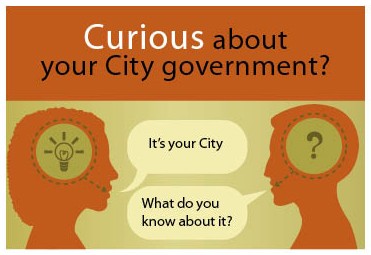~ Guest Bloggers can submit posts to this site. The opinions of the authors are theirs alone and do not necessarily reflect the position of the City of Toronto, Civic Engagement Toronto or Toronto Civics 101. ~
The following post comes to us from Adil Dhalla:
There were two competing feelings I had following Session 3 of Toronto Civics 101 – How City Council Makes Decisions – and I’m still not sure if I’ve reconciled between the two.
The first feeling was motivated by realizing the sheer dearth of information the city shares online with its citizens. For example, we are the first municipality in Ontario to provide all of our councilor’s expenses online. It turns out; Mayor Miller’s use of a broom during his first Mayoral campaign was indeed representative of his desire for accountability and not some bizarre attempt to appeal to the Harry Potter obsessed voters (we know you’re out there). Joking aside, you really get the sense that the city goes to extreme lengths to share their activities online and for this act of ongoing transparency they must be lauded.
The competing feeling, however, was wondering how valuable this actually is for the citizens of Toronto. On face value, the more we have the better. But if the majority of the information is just a resource for decisions already made, then it’s not exactly what we need. Rather, citizens need the information – the same information which guides council’s decisions – in advance. We need this because of the relatively little impact petitions actually have and because (as we learned on Thursday), citizen-lead plebiscites are not possible and there is no data on aggregated deputations. With more of a focus on providing information in advance of decisions being made, citizens have the opportunity to become truly engaged with the decisions making process.
Having said that, maybe I’m being naïve because we may never come to any decisions if the floor is totally open (especially with 45 different voices already present). It really is a testament to our civic leadership how many Agenda items (3901 total in 2009) they go through each year and opening things up further might slow them down in future years. Enter ‘my competing feelings’.
Some other light-hearted thoughts from the evening worth sharing:
• The city’s income is primarily earned via property tax and given the city’s maturity, the main way to increase this total without increasing the actual tax is redevelopment. Finally I’m beginning to understand why the city seems to really like condos
• The city by law must have a balanced budget. Giving our rising costs, that means more condos.
• The Mayor doesn’t have the type of executive powers most assumed that he possesses. I’m willing to bet the misconception has something to do with our previous Mayor infamously bringing in the military years ago.
On a more serious final note, I really think there was some merit behind a gentlemen’s suggestion for the city to buy the Maple Leafs. Can someone please table this topic for the next city council meeting?
________
Adil Dhalla (@TheNetTale) is the founder of creativitykilledtherecession.org and proud to be among the inaugural attendees of T.O. 101
Subscribe to:
Post Comments (Atom)

Transparency is essential...is it ineffective because decisions have already been made; yes, could it help with future decision making; yes. Having this information is better than not having them. I agree with you, city must be lauded for having this information available on-line.
ReplyDeleteHaving said that,giving Civic-101-ers a tour of toronto.ca web site is a good idea. I certainly cannot find half of the things that is mentioned during the sessions on city web site. I don't want to refer to the presentation slides or have to bookmark links. There is a logical way that this information is categorized. That's what I want to learn.
I find that attending city public consultations is an interesting way to participate in planning discussions before decisions are finalized. City staff have taken a first cut at a discussion framework, and engineers have taken a preliminary whack at possible solutions, but they, and the local councillor, are open to new questions, opinions, and different perspectives.
ReplyDelete